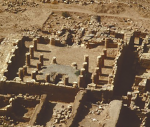You are here
South Sudan: War and misery continue one year later
By AP - Dec 15,2014 - Last updated at Dec 15,2014
NAIROBI, Kenya — One year after mass violence broke out in South Sudan, battles between government forces and rebels continue, and aid officials say international assistance is needed to help residents stave off mass hunger.
Government troops and armed youths have been battling in Upper Nile state in recent days, a sign that widespread violence could return now that the six-month rainy season has ended.
Fighting broke out last December between President Salva Kiir's troops and those loyal to former vice president Riek Machar. Since then, more than 1.5 million South Sudanese have fled their homes, leaving many families without anyone to plant crops. The aid community had feared famine, but an injection of food supplies by the World Food Programme and other groups helped avoid that. If fighting resumes the specter of famine could return in 2015, warn aid groups.
Concern about South Sudan is waning and that it risks becoming "yet another forgotten state", the International Committee of the Red Cross (ICRC) said Sunday.
"The spotlight may have turned away from South Sudan in recent months, but needs remain enormous and the situation is still serious," said Franz Rauchenstein, the head of the ICRC in South Sudan. "People caught up in this conflict cannot be forgotten."
The two sides have signed several peace deals brokered by neighbouring governments, but none has actually stopped the warfare in the oil-rich country.
Much of the violence has pitted the Dinkas who back Kiir against the Nuer who support Machar. Gross atrocities were committed by both sides, including the killings of elderly patients in hospital wards as well as the slaughter of hundreds of civilians in the capital last December, according to human rights groups.
South Sudan peacefully broke away from Sudan in 2011 after decades of war, becoming the world's newest nation. But the outbreak of violence last year shattered the goodwill the country had built up internationally.
South Sudan's cycle of ethnic revenge killings creates an urgent need to hold those responsible to account, said Human Rights Watch, adding that the war's widespread abuses should be investigated as war crimes and crimes against humanity.
Related Articles
JUBA — South Sudanese Vice President Riek Machar's movement suffered a fresh blow on Thursday as his deputy quit to join a rival military fa
JUBA — South Sudan’s President Salva Kiir said he is ready to accept a peace deal to end a civil war and set up an inclusive new government.
South Sudanese troops and rebels battled around a key oil hub on Monday, defying mounting pressure to end four months of civil war despite US threats of “serious implications” if fighting continues.

















